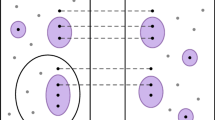Abstract
Inspired by Hintikka’s ideas on constructivism, we are going to ‘effectivize’ the game-theoretic semantics (abbreviated GTS) for independence-friendly first-order logic (IF-FOL), but in a somewhat different way than he did in the monograph ‘The Principles of Mathematics Revisited’. First we show that Nelson’s realizability interpretation—which extends the famous Kleene’s realizability interpretation by adding ‘strong negation’—restricted to the implication-free first-order formulas can be viewed as an effective version of GTS for FOL. Then we propose a realizability interpretation for IF-FOL, inspired by the so-called ‘trump semantics’ which was discovered by Hodges, and show that this trump realizability interpretation can be viewed as an effective version of GTS for IF-FOL. Finally we prove that the trump realizability interpretation for IF-FOL appropriately generalises Nelson’s restricted realizability interpretation for the implication-free first-order formulas.
Similar content being viewed by others
References
Abramsky, S., and J. Väänänen, From IF to BI: A tale of dependence and separation, Synthese 167(2):207–230, 2009. doi:10.1007/s11229-008-9415-6.
Dummett, M., Truth and Other Enigmas, Harvard University Press, 1978.
Dummett, M., The Logical Basis of Metaphysics, Harvard University Press, 1993.
Enderton, H. B., Finite partially-ordered quantifiers, Zeitschrift für Mathematische Logik und Grundlagen der Mathematik 16(8):393–397, 1970. doi:10.1002/malq.19700160802.
Hintikka, J., The Principles of Mathematics Revisited, Cambridge University Press, Cambridge, 1996. doi:10.1017/CBO9780511624919.
Hintikka, J., and G. Sandu, Informational independence as a semantical phenomenon, in J. E. Fenstad et al. (eds.), Logic, Methodology and Philosophy of Science VIII, Studies in Logic and the Foundations of Mathematics 126, North-Holland Publishing Company, 1989, pp. 571–589. doi:10.1016/S0049-237X(08)70066-1.
Hodges, W., Compositional semantics for a language of imperfect information, Logic Journal of the IGPL 5(4):539–563, 1997. doi:10.1093/jigpal/5.4.539.
Hodges, W., Some strange quantifiers, in J. Mycielski et al. (eds.), Structures in Logic and Computer Science: A Selection of Essays in Honor of A. Ehrenfeucht, Springer, 1997, pp. 51–65. doi:10.1007/3-540-63246-8_4.
Kleene, S. C., Introduction to Metamathematics, North-Holland Publishing Company, 1952.
Kontinen, J., J. Väänänen and D. Westerståhl (eds.), Special Issue on Dependence and Independence in Logic, Studia Logica 101(2), Springer, 2013.
Mann, A. L., G. Sandu and M. Sevenster, Independence-Friendly Logic: A Game-Theoretic Approach, Cambridge University Press, 2011.
Matiyasevich, Yu. V., Hilbert’s Tenth Problem, MIT Press, 1993.
Nelson, D., Constructible falsity, Journal of Symbolic Logic 14(1):16–26, 1949. doi:10.2307/2268973.
Osborne, M. J., and A. Rubinstein, A Course in Game Theory, MIT Press, 1994.
Rogers, H., Jr., Theory of Recursive Functions and Effective Computability, McGraw-Hill Book Company, 1967.
Väänänen, J., Dependence Logic: A New Approach to Independence Friendly Logic, Cambridge University Press, 2007.
van Benthem, J., Logic in Games, MIT Press, 2014.
Walkoe, W. J., Finite partially-ordered quantification, Journal of Symbolic Logic 35(4):535–555, 1970. doi:10.2307/2271440.
Wittgenstein, L., Tractatus Logico-Philosophicus, Routledge & Kegan Paul, 1922.
Yang, F., On Extensions and Variants of Dependence Logic—A Study of Intuitionistic Connectives in the Team Semantics Setting, Ph.D. thesis, University of Helsinki, 2014. Available online at https://helda.helsinki.fi/handle/10138/43011.
Acknowledgements
The research of S. P. Odintsov was partially supported by the Grants Council (under RF President) for State Aid of Leading Scientific Schools (Grant NSh-6848.2016.1). The research of S. O. Speranski was partially supported by the Alexander von Humboldt Foundation.
Author information
Authors and Affiliations
Corresponding authors
Additional information
Presented by Heinrich Wansing
Rights and permissions
About this article
Cite this article
Odintsov, S.P., Speranski, S.O. & Shevchenko, I.Y. Hintikka’s Independence-Friendly Logic Meets Nelson’s Realizability. Stud Logica 106, 637–670 (2018). https://doi.org/10.1007/s11225-017-9760-x
Received:
Published:
Issue Date:
DOI: https://doi.org/10.1007/s11225-017-9760-x




